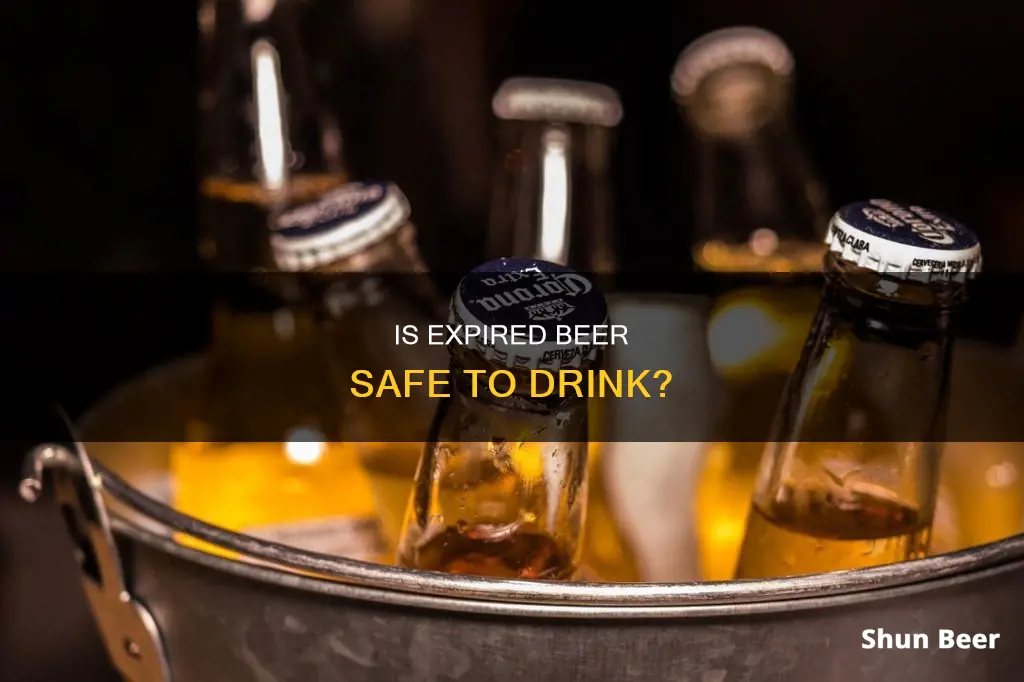
Beer typically has a “best before” date, which is different from a use by date. While it's not recommended to drink beer that has passed its best before date, it's not necessarily unsafe. The alcohol content and fermentation process make it difficult for pathogens to survive in beer. However, the taste of the beer may change over time, and it may lose its carbonation, making it unpleasant to drink. The shelf life of beer depends on various factors, such as the type of beer, storage conditions, and exposure to light, oxygen, and heat.
| Characteristics | Values |
|---|---|
| Can you drink beer 2 months out of date? | Yes, but it may not taste good. |
| Will drinking beer 2 months out of date make you sick? | No, it's unlikely to make you ill. |
| What affects the shelf life of beer? | Light, oxygen, heat, and time. |
| How long does beer last in the fridge? | Up to two or three years. |
| How long does beer last at room temperature? | Four to nine months. |
What You'll Learn

Beer has a ''best before'' date, which is more of a guideline on quality than safety
Beer typically has a "best before" date, which is more of a guideline on quality than safety. This means that the beer will start to lose its quality after the stated date, but it is still safe to consume. The taste of the beer may change, and it may not be as refreshing as a fresh beer, but drinking an out-of-date beer will not make you sick.
The reason beer doesn't pose the same health risks as expired food is due to the fermentation process used in brewing, as well as its low pH level and alcohol content. These factors create an unfriendly environment for microorganisms, preventing pathogenic bacterial growth.
However, it's important to note that the taste of beer can change significantly over time. While some beers, like porters and stouts, can improve with age, similar to wine and whiskey, others, such as IPAs, gradually lose their flavour and aroma. The presence of oxygen, heat, and light can also cause flavours to deteriorate, with oxidation resulting in a papery or cardboard-like taste.
To maintain the freshness of your beer, it's recommended to store it in a cool, dark place, preferably in the refrigerator. If stored properly, beer can last beyond its "best before" date, with a typical lager remaining drinkable for 6-24 months if refrigerated, and up to 9 months if not.
The Magic Behind Beer Filtration: Using Sheet Filters
You may want to see also

Beer won't make you sick, but it can taste bad
Beer typically has a ''best before' date, which is a guideline on quality rather than safety. This means that the beer will start to lose its quality after the stated date, but it can still be consumed. While drinking beer past its "best before" date is generally safe, it's important to note that the taste of the beer may change over time.
The fermentation process, low pH level, and alcohol content of beer create an environment that is unconducive to the growth of harmful microorganisms. As a result, even if a beer sits on the shelf for years, it is unlikely to pose a health risk if it remains sealed. However, it's important to inspect the beer for any signs of spoilage before consumption.
That being said, there are a few rare situations where old beer should be discarded. If the beer has lost its carbonation and fizz, it indicates that the seal was broken, and the flavour will be significantly altered. Additionally, if a non-tangy or non-acidic beer develops a vinegary taste, it suggests bacterial contamination, and it's best to dispose of it.
While outdated beer may not make you sick, the taste can deteriorate over time. Beers can develop off-flavours, becoming overly sweet or tasting like "wet cardboard." To maintain the freshness of beer, it is recommended to store it in a cool, dark place, preferably in a refrigerator, and to consume it as close to its "born-on" date as possible.
In summary, while drinking beer that is two months past its "best before" date may not pose a health risk, it is important to inspect the beer for any signs of spoilage and be prepared for potential changes in taste.
The Magic Behind Beer: A Brewery Tour
You may want to see also

Beer should be stored in a cool, dark place
Beer is best stored in a cool, dark place. This is because beer is susceptible to light and heat, which can cause it to spoil or develop a skunky taste. Beer should be stored at temperatures between 45 and 55 degrees Fahrenheit (or 10 to 13 degrees Celsius). Keeping beer in a refrigerator can extend its viability for up to two years.
If you're storing beer at room temperature, make sure it's not in direct sunlight and that the sun can't reach it. Beer bottles should be stored in a dark place, preferably made of amber or brown glass, as these offer better protection from light. Green bottles are also recommended, but clear bottles should be avoided. If you're storing beer in a basement or pantry, light streaming in through a window could affect its flavour.
Canned beer is preferable to bottled beer if you want to avoid light exposure, as cans block out all light. Canned beer also has a longer shelf life and offers better protection from oxygen, which can cause oxidation and a papery taste.
It's also important to store beer in an upright position to limit air contact. This is true for both bottles and cans.
Beer and Aimovig: What You Need to Know
You may want to see also

Beer in clear or green bottles is more susceptible to light exposure
Beer is susceptible to light exposure, and this can cause it to go bad. Beer bottled in clear or green glass is particularly vulnerable to UV light, which can cause a chemical reaction in the hops, resulting in an unpleasant skunky taste and smell.
The use of clear and green glass bottles for beer can be traced back to the 19th century. Clear glass was initially used, but it was soon discovered that beer left out in the sun in these bottles would quickly develop an offensive smell and taste. This is because UV rays can permeate the beer, causing a chemical reaction that gives off a skunky odour. This phenomenon is known as "lightstruck".
In the 1930s, beer producers switched to brown bottles, which effectively filtered out the harmful UV rays and prevented the beer from going skunky. However, after World War II, there was a shortage of brown glass, so European brewers began exporting their beer in green bottles. These beers were often of extremely high quality, and so the green bottle became a status symbol for great beer.
Today, some brewers continue to use clear and green glass bottles, sometimes for marketing reasons, and sometimes because their beer contains little to no hops, which are the ingredients most susceptible to damage from light. Some brewers also use artificial or stabilised hops, which are less sensitive to light, allowing them to use clear or green glass bottles without worrying about lightstruck beer. Additionally, some glass suppliers now apply clear, UV-protected coatings to glass bottles to keep the beer fresh, regardless of the colour of the glass.
Nevertheless, light is generally considered an enemy of beer, and it is advisable to keep beer bottles in a dark place to prevent them from going skunky.
How Long Does Beer Last Once Opened?
You may want to see also

Beer can be used for cooking, even if it's expired
Beer typically has a "best before" date, which is more of a guideline on quality rather than safety. Drinking beer past its "best before" date is usually safe, but the taste may have deteriorated. However, if a beer develops a vinegary taste, it should be discarded as this indicates bacterial growth.
Expired beer can still be used for cooking, and in fact, it can add flavour to a dish. Here are some ways to use expired beer for cooking:
- Grilling meat – Place a half-full can of beer inside a chicken before grilling. The beer will gradually evaporate, leaving the meat juicy and flavourful.
- Marinating meat – Poke holes in the meat, place it in an airtight container, and pour beer over it. Marinate in the refrigerator overnight. Beer has been found to reduce carcinogenic levels in grilled meat and enhance its antioxidant and phenolic content.
- Baking bread – Beer gives bread a distinct earthy, rich, malty, and slightly sweet flavour. The yeast in the beer also helps the bread rise.
- Boiling sausages – Beer can be used to boil sausages before grilling, adding flavour to the meat.
- Beer-battered fish and chips – Beer can be used as a batter for fish and chips, creating a crispy and flavourful coating.
- Chilli – Beer can be added to chilli to give it a unique flavour.
- Beer cheese soup – Beer can be used as a base for a cheese soup, resulting in a creamy and flavourful dish.
- Pulled pork – Pour beer over a pork shoulder in a slow cooker, along with brown sugar, for a tasty and tender dish.
- Beer mac and cheese – Beer can be added to mac and cheese to give it a flavour boost.
- Poaching eggs – Beer can be used as a poaching liquid for eggs, adding a unique twist to the classic breakfast dish.
- Stews – Beer can be used as a base for stews, adding depth of flavour and tenderness to the meat.
So, if you have expired beer, don't discard it! Instead, get creative in the kitchen and experiment with these cooking ideas. Just remember to avoid using skunked beer, as cooking will concentrate the unpleasant flavours and aromas.
Beer for Slugs: Does It Work?
You may want to see also
Frequently asked questions
Yes, you can. "Best before" is a guideline on quality rather than safety. Beer doesn't expire in the same way that food does. The worst that will happen is that it will taste bad.
There are a few signs that your beer has gone bad. If it has a bad aroma, or it's missing the usual fizzing sound and foaming when you open it, it's probably off. You could also check the bottom of the bottle for excessive sediment.
Beer is best stored in a cool, dark place, like a basement or cellar. If it was refrigerated when you bought it, keep it in the fridge. If it's bottled, store it upright.







